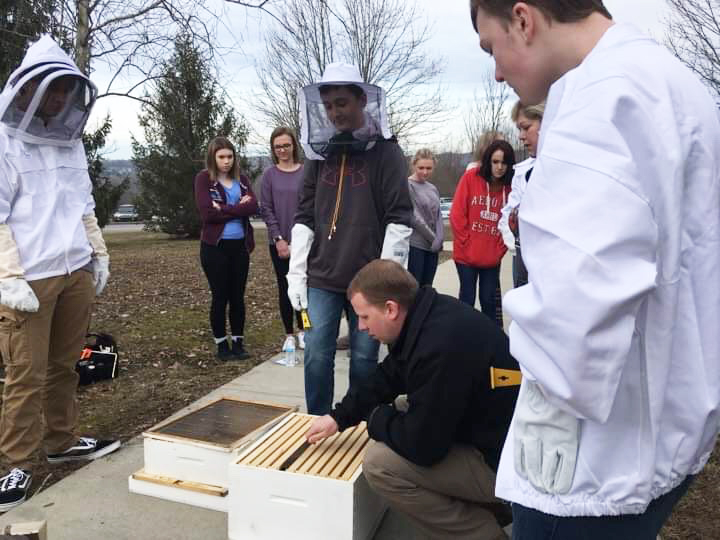By Gabriella Brown for The Dominion Post
Newsroom@DominionPost.com
MORGANTOWN — Honeybees play one of the most important roles in agricultural success, and the same can be said for the dedicated beekeepers in Monongalia County responsible for raising them.
On the first Tuesday of each month, the Monongalia County Beekeepers Association meets to prepare for upcoming events, and typically invites speakers from around the state to educate participants.
The club has 148 members, and is always looking for new people to join. Although the club is mainly made up of experienced beekeepers, classes for beginners are offered throughout the year.
Debbie Martin, secretary of the association, said the next class will be offered in the fall. Each class consists of three Saturday meetings from 10 a.m. to 2 p.m., and participants learn the basic strategies required for being a successful beekeeper.
For experienced beekeepers, the club provides opportunities to attend events and earn certifications.
Every year, the club travels to conferences to present projects, learn about what other clubs are working on and test their skills through beekeeper certification exams. Three levels of certification are offered, starting with apprentice level, then certified level and then master level.
The Monongalia County beekeepers are no strangers to passing these exams with flying colors. In the club’s first year, seven members passed the apprentice level. Martin and Debby Mayne, another member of the club, plan to finish their certified level during the conference in Fairmont in August.
During the fall conference, speakers from across the country come to talk about anything bee-related, from products made from honey and wax to pest management.
When not traveling to events, the club is a great way to gain a support system from other members.
“It is really hard to keep bees since there are so many things that can go wrong,” said Keith Straka, vice president of the association. “That can be discouraging for people if they don’t have support of the club or mentors that can help them through situations.”
Although attending events and learning how to be an efficient beekeeper is an important aspect of the club, Martin said their main goal is to educate the public.
“We want to educate as many people as possible, and that is why we have classes,” Martin said.
People interested in learning more about beekeeping are welcome to visit the local apiary, located on Stewart Street. It’s typically open on Tuesdays. Another apiary is in development, and will be used for educating beginners through hands-on interaction with the bees.
“Having two apiaries gives us a chance to educate more people,” Martin said. “It gives people a chance to see how it is done and see if they can handle it or not.”
Educating the public allows the club to spread its mission to both members and non-members alike. Without being a member, Martin said there are plenty of opportunities for people to help support the mission of the club.
To help protect honeybees, Martin said she recommends avoiding the use of weed killers, and buying flowers that do not contain neonicotinoids, an insecticide harmful to bees.
By being mindful of bees, Martin said people can ensure they carry on into following generations. With the dire need for bees to live on due to their crucial environmental impact comes the equally important task of making sure beekeeping stays alive.
“We are trying to get younger people involved and interested in beekeeping and so we can pass the reins to them later in their beekeeping journey,” Martin said. “When people realize how important honey bees’ pollination is for the survival of the human race, then they will have to step up and care for the bees because the older beekeepers won’t be able to take care of them anymore.”
Martin and Straka work to make getting the younger generation involved a priority of the club through weekly meetings with the East Fairmont High School honeybee club.
“Keith Straka and myself have been meeting with the club every week and trying to get new beekeepers interested in beekeeping,” Martin said. “It’s the home of the Busy Bee Band and
Honeybees, so it only seemed fitting that they have a bee club.”
Along with learning about the important impact honeybees have on the environment and role beekeepers play, Martin said the most rewarding part of the club is the people she has gotten to interact with.
“All the people are great,” Martin said. “I have met people from all over the state, and I have met people that I would never have had access to meet before.”
TWITTER @DominionPostWV




